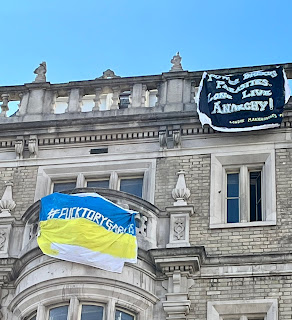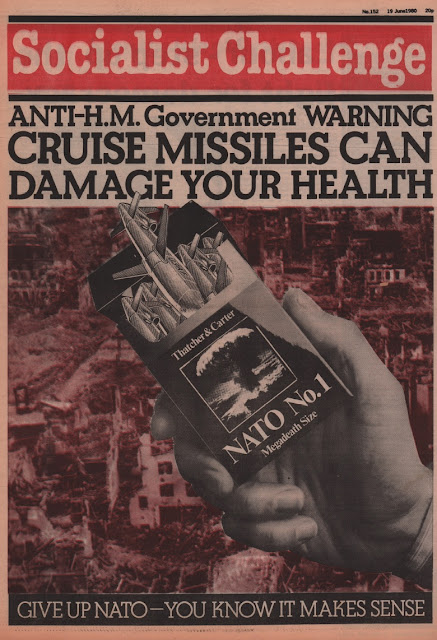 |
| photo from Astronauts on facebook |
 |
| image from discogs |
 |
| image from Discogs |
 |
| The Astronauts at Club 85 in Hitchin in May 2022 |
 |
| photo from Astronauts on facebook |
 |
| image from discogs |
 |
| image from Discogs |
 |
| The Astronauts at Club 85 in Hitchin in May 2022 |
A group of Ukrainian anarchist squatters have occupied their second building in London. The London Makhnovists Centre at 187 Fleet Street opened on 18th June 2022 with a fundraiser gig for victims of the war in Ukraine.
In a statement at their website the group say 'Make Solidarity Louder than Bombs. We occupy this property in protest against the war in Ukraine and those who profit from it.... We're going to gather around art, culture and dancing as a way to direct funding to refugee aid at the Ukrainian border'
 |
| Banners outside read 'Power breeds parasites, long live anarchy!' and #fucktorygarchs |
In March the same group took over a London mansion in Belgrave Square belonging to Russian billionaire Oleg Deripaska, and were evicted by riot police.
[Top four photos taken by me, Tuesday 28 June 2022, statement and bottom two photos from London Makhnovists website]
In 1979, Conservative MP John Corrie introduced a private member's bill aiming to restrict abortion rights. In the climate of New Right ascendancy marked in Britain by the election of Margaret Thatcher in that year there were real fears that this would become law and a campaign was launched against the Corrie Bill. The biggest event was a massive demonstration in London in October 1979 called by the Trades Union Congress and the National Abortion Campaign. In the event Corrie did not succeed in getting his bill through parliament and the 1967 Abortion Act remained intact.
Here's extracts from a couple of reports of the demo highlighting the role of (post) punk bands.
Lucy Toothpaste:
Get up, eat my porridge, put on my feminist radical chic (or do I mean my radical feminist chic?), anyway, put on my loud yellow coat, fluorescent socks, sensible shoes etc. etc., select a thoughtful cluster of badges for the occasion and set off. Climb on the bus, discover that all the other passengers are wearing those hideous pink 'March for Abortion Rights October 28' badges too. Meet more of the same at Finsbury Park tube.
 |
| Peter Kennard's design for the flyer/poster |
The announcement of the deployment of a new generation of US nuclear weapons in Europe, coupled with increasing tension between NATO and the Soviet Union, led to a mass peace movement across the West in the early 1980s. In England the first major demonstration against these cruise missiles was called by the Labour Party on June 22 1980, during a brief period when the leadership of the Party were voicing opposition to nuclear weapons.
Around 25,000 people marched in the pouring rain from London's South Bank to Hyde Park. Speakers included veteran peace campaigner Fenner Brockway, soon to be Labour leader Michael Foot and the actor Susannah York who told the crowd, 'I refused to accept that 25,000 people here today are one fortieth of a megadeath. I am not a millionth of a megadeath. We are ourselves'.
The image of the megadeath and mass nuclear destruction haunted the nightmares of young people like myself getting involved in this new peace movement and recurs across popular culture in this period. In its report of the demo, Socialist Challenge noted that 'One of the most striking features of the demonstration was the high proportion of young people who turned out. Groups of friends carried home-made placards calling for an end to war: "Fall in against fallout", "Education not Missiles", "Wage War on Weapons", "Germ Warfare means Nightmare".
 |
| Socialist Challenge, 12 June 1980 |
 |
| Socialist Challenge front page for the demo - demanding 'Give up NATO', which was not the position of the Labour Party organisers |
Terrible to hear of the murder of Dom Phillips and Bruno Pereira in Brazil - not just an isolated act of violence but a moment in a brutal war against those trying to protect the Amazon and those living in it, encouraged by president Bolsonaro and enabled by his global far right backers.
All a long way from the 1990s when Dom made his name as editor of Mixmag magazine, the biggest and most popular of the dance music magazines of that time with a circulation reaching up to 80,000 a month. It might not have always been the coolest, steering as it did towards the mainstream of UK clubbing, documenting and itself accelerating the growth of mega club brands and big name DJs. This was a phenomenon Phillips himself was to write about in his 2009 book 'Superstar DJs Here We Go!': 'From 1992, when acid house moved into legal venues, until 2000, this was the era of superstar DJs and superclubs. A generation gleefully lost itself in a maelstrom of disco euphoria and house music and clubbing became the defining sound and lifestyle of 1990s Britain'.
Mixmag featured interviews with DJs, musicans and producers, but Dom Phillips clearly realised that it was the clubbing experience itself that was central and the diverse clubbers who were the real stars. The mid-1990s 'were the golden years of 1990s clubbing, when you could meet anyone and be anyone, when the most unlikely networks of people were formed, criss-crossing the country. Club after club sprouted up in drab northern and Midland cities, little blooms of colour and life. Being a clubber felt special. It was about belonging. And for many clubbers, that sense of identity was a huge part of the lifestyle... Clubbing felt like a big, happy party that went on and on' (note by this time people tended to identify as clubbers, hardly anybody was calling themselves a raver).
Those buying the magazine wanted to have their amazing nights out reflected back at them and to see people like themselves dressed up, dancing and ecstatically happy. And this is what Mixmag offered, as in these examples from one issue (September 1997). A piece 'What are you proud of? captures people at the Pride festival on Clapham Common, as well as 'Goodbye Cruel World' in Leicester, Equinox in Wilmslow, The Leadmill in Sheffield and a Reclaim the Streets party in Nottingham.
 |
| Mixmag, September 1997 - Goldie is the cover star, Bjork also interviewed inside |
 |
| Dom Phillips, 1964-2022. Rest in Power All quotes from Dom Phillips, 'Superstar DJs Here We Go!: The Rise and Fall of the Superstar DJ' (2009) See also obituary in Mixmag by David Davies |
A police raid on an Italian-run club in Soho in 1900 led to fighting with police outside and the proprietors being jailed.
The Co-operative Club was at 2 Little Dean Street and was raided at one o'clock in the morning where around 100 people were drinking and 'dancing to piano music'. Previously 'dancing had been seen going on, men sometimes dancing with men, and very bad language had been heard in the place. All the men found there were low-class foreigners'. During the raid a 'disturbance took place' outside and 10 people were arrested - one for assaulting a constable (Evening Standard 31 July 1900)
Francesco Covini, the alleged club proprietor, and Sebastian Cordori, a waiter, were charged with 'keeping a common, ill-governed and disorderly house'. They were jailed for 12 months and 6 months respectively (London Evening Standard, 10 August 1900)
The most famous moment of opposition to the Queen's 'Silver Jubilee' in 1977 (to mark 25 years on the throne) was of course the success of The Sex Pistols' 'God Save the Queen' single which got to number 2 in the charts despite a lack of radio play and many shops refusing to sell it - and everyone knows it probably would have been number one without some rigging of the charts.
I still think this is the greatest of the first wave UK punk songs- 'God save the Queen, She ain't no human being, There is no future In England's dreaming...We're the flowers in the dustbin, We're the poison in the human machine. We're the future, we're the future'
Still there were other expressions of anti-monarchist feeling from the radical left in Britain and Ireland. Here's a few examples:
 | |||
 |
| 'Stuff the Jubilee - roll on the red republic' (front and back cover of Socialist Worker, 4 June 1977 -from excellent Splits & Fusions Archive) |
 |
Anti-Jubilee Picnic organised by Y Fflam ddu/Black Flame (Swansea Anarchist Group) Freedom (Anarchist Fortnightly), May 28 1977 |
 |
Freedom (Anarchist Fortnightly), June 11 1977 |
 |
| Martin 'Doco' Doherty memorial fund appeal, An Phoblact, 23 June 1994 |